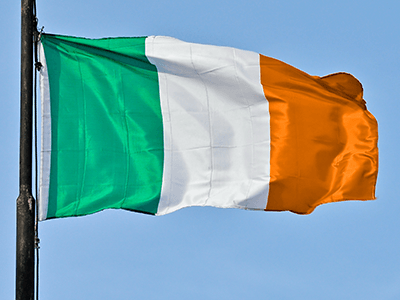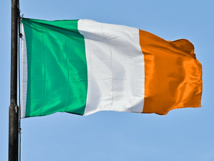In 2014, growth rates were 5.2% and in the first half of 2015, GDP has increased by 7% compared with the same period of the previous year.
Two years ago, nobody could even dream about the fact that the Irish economy can grow so fast. During the crisis, most of the major Irish banks went bankrupt, and their salvation took 64 billion euros, or nearly two-thirds of GDP. This plight of the banking sector meant that the Irish state itself was in need of urgent and large-scale support from the EU and the IMF in 2010.
From the pre-crisis peak in 2007 to its lowest point in late 2009, Ireland's economy has decreased by 11.2%. The subsequent recovery was short, and the economy once began to slip again in 2012 and the first half of 2013.
The severity of the crisis, associated with the bursting of the housing bubble, was so serious that, despite today's rapid growth, per capita GDP is still below the peak of 2007 (although it exceeded the pre-crisis maximum of a year ago).
The effects of the recession and the rescue of the banking sector are still felt in the public finances. Despite the fact that the national debt should fall below 100% of GDP this year (after 120% in 2012 and 2013), it is still significantly higher than the 24% in 2007.
However, even in the most difficult period of crisis, the Irish economy has kept a certain strength. It is still attractive for US multinationals, which use Ireland as the main production and administrative base in Europe, partly thanks to a highly educated workforce and low corporate taxes (only 12.5%). Ireland has its own plant of such pharmaceutical giant like Pfizer. The country also hosts Apple, Facebook and Google.
The presence of transnational corporations has helped Ireland when the rest of its economy was in a depression: net trade (exports-imports) completely offset fall in domestic in some periods.
Scale of the corporations’ presence is proved by the fact that the total exports of Ireland was worth 114% of GDP in the past year; import was also very high (at 95%). Ireland wins because it exports to the United States and the United Kingdom, whose economies are developing way faster than the euro zone.
Currently, the Irish exports has another incentive - the weak euro, which has been trading at 15-20% lower than previous year during most of 2015.
Domestic demand helps the Irish economy too. Although there’s no large investments in construction, number of them in total is steadily moving upwards, as more and more businesses are spending on new equipment. Consumer spending is increasing too: 3.3% in the first half of 2015 compared to 2% in 2014.
Despite the rapid growth, it is not a repeat of destructive overheating of the economy a decade ago. Property prices are growing rapidly, particularly in Dublin. Yet, as they have fallen by half during the crisis, they are still one-third below the peak level of 2007.
There is not even a hint on any construction boom, although the country feels a shortage of housing. Last year, 11 th. apartments were built in Ireland (about 90 thousand in 2006). Lending slows down rather than increases. It is not surprising that banks are still healing wounds gained during the crisis.
Although the economy is accelerating, it has not yet reached its peak. Unemployment has dropped from a peak of 15.2% in early 2012 to 8.9% in October. Yet, there is still an opportunity to further reduce it. Economists believe that it could fall to 6%, not even pushing inflation. Reducing the debt burden also gives hope that households will increase spending.
Perhaps the greatest cause for concern are doubts about ability of Irish politicians to give up their "bad" habits. Coalition government led by Andy Kenny had consistently adhered to the policy of austerity. However, the program expired two years ago.
source: economist.com
Two years ago, nobody could even dream about the fact that the Irish economy can grow so fast. During the crisis, most of the major Irish banks went bankrupt, and their salvation took 64 billion euros, or nearly two-thirds of GDP. This plight of the banking sector meant that the Irish state itself was in need of urgent and large-scale support from the EU and the IMF in 2010.
From the pre-crisis peak in 2007 to its lowest point in late 2009, Ireland's economy has decreased by 11.2%. The subsequent recovery was short, and the economy once began to slip again in 2012 and the first half of 2013.
The severity of the crisis, associated with the bursting of the housing bubble, was so serious that, despite today's rapid growth, per capita GDP is still below the peak of 2007 (although it exceeded the pre-crisis maximum of a year ago).
The effects of the recession and the rescue of the banking sector are still felt in the public finances. Despite the fact that the national debt should fall below 100% of GDP this year (after 120% in 2012 and 2013), it is still significantly higher than the 24% in 2007.
However, even in the most difficult period of crisis, the Irish economy has kept a certain strength. It is still attractive for US multinationals, which use Ireland as the main production and administrative base in Europe, partly thanks to a highly educated workforce and low corporate taxes (only 12.5%). Ireland has its own plant of such pharmaceutical giant like Pfizer. The country also hosts Apple, Facebook and Google.
The presence of transnational corporations has helped Ireland when the rest of its economy was in a depression: net trade (exports-imports) completely offset fall in domestic in some periods.
Scale of the corporations’ presence is proved by the fact that the total exports of Ireland was worth 114% of GDP in the past year; import was also very high (at 95%). Ireland wins because it exports to the United States and the United Kingdom, whose economies are developing way faster than the euro zone.
Currently, the Irish exports has another incentive - the weak euro, which has been trading at 15-20% lower than previous year during most of 2015.
Domestic demand helps the Irish economy too. Although there’s no large investments in construction, number of them in total is steadily moving upwards, as more and more businesses are spending on new equipment. Consumer spending is increasing too: 3.3% in the first half of 2015 compared to 2% in 2014.
Despite the rapid growth, it is not a repeat of destructive overheating of the economy a decade ago. Property prices are growing rapidly, particularly in Dublin. Yet, as they have fallen by half during the crisis, they are still one-third below the peak level of 2007.
There is not even a hint on any construction boom, although the country feels a shortage of housing. Last year, 11 th. apartments were built in Ireland (about 90 thousand in 2006). Lending slows down rather than increases. It is not surprising that banks are still healing wounds gained during the crisis.
Although the economy is accelerating, it has not yet reached its peak. Unemployment has dropped from a peak of 15.2% in early 2012 to 8.9% in October. Yet, there is still an opportunity to further reduce it. Economists believe that it could fall to 6%, not even pushing inflation. Reducing the debt burden also gives hope that households will increase spending.
Perhaps the greatest cause for concern are doubts about ability of Irish politicians to give up their "bad" habits. Coalition government led by Andy Kenny had consistently adhered to the policy of austerity. However, the program expired two years ago.
source: economist.com



















